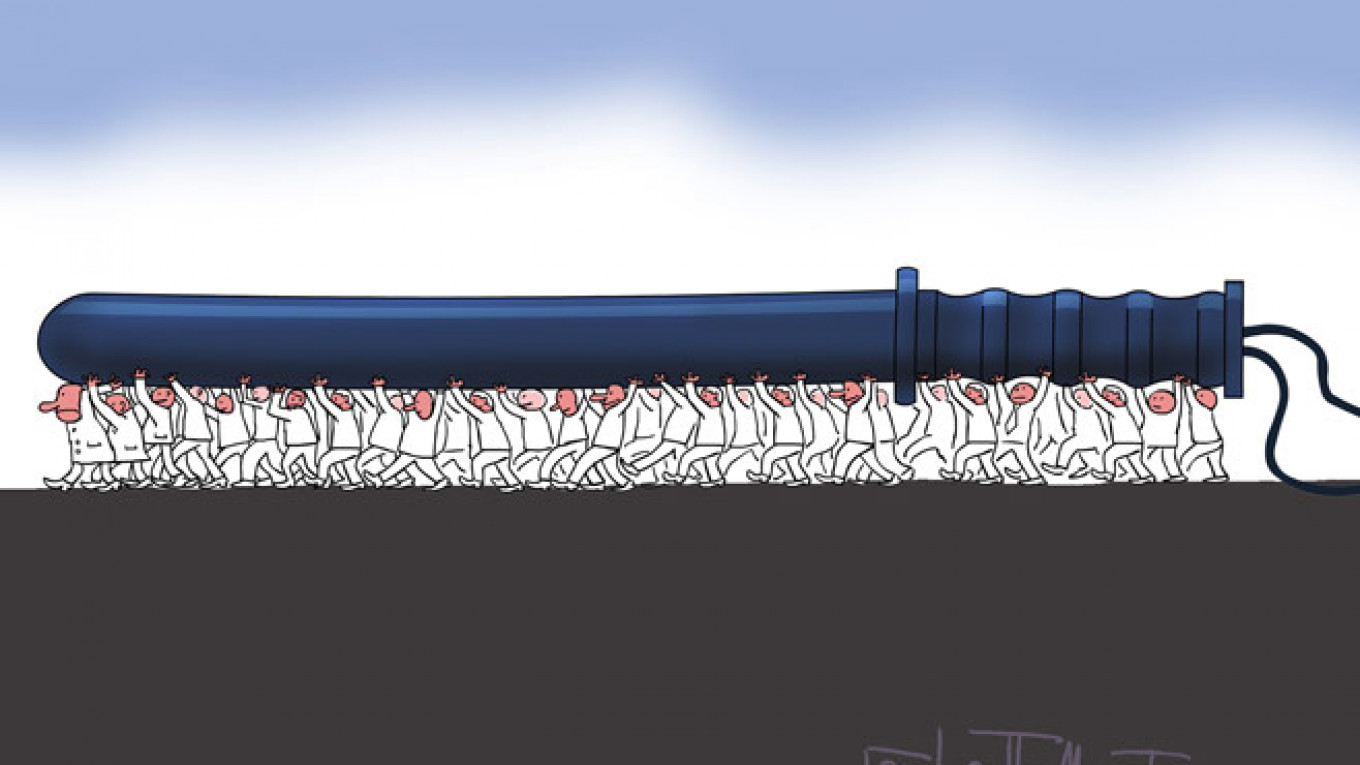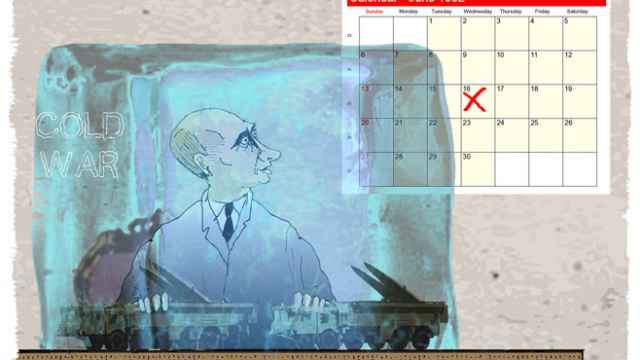Fifty years from now historians will no doubt wonder why President Vladimir Putin was preparing to use force against his own people at a time when he enjoyed a nearly 90 percent approval rating.
During a roundtable discussion at the Army 2015 forum, Defense Minister Sergei Shoigu said that his ministry plans to commission research on the subject of "color revolutions and society."
"Some say the army should remain on the sidelines and not take part in the political process, while some say the opposite. We will order research into this question," he said.
"We do not have the right to repeat the collapses that occurred in 1991 and 1993," Shoigu explained. "We must understand how to prevent that and how to educate our youth so that they move in the right direction, one that will provide for the continued peaceful, progressive movement of the country."
In so saying, the defense minister left no doubt as to which conclusion the future authors of that study should draw.
The fact that the Defense Ministry decided to farm out that study indicates that it has a discipline problem.
After all, Russia's top generals announced at an international conference more than a year ago that "color revolutions" are actually a new form of warfare invented by those treacherous Americans as a way of inciting the people against dictators whom Washington finds undesirable — that is, against leaders who, "in full accordance with the law," have secured for themselves a perpetual hold on power.
And thus, despite the fact that the Constitution implies the eternal reign of the "fathers of the people," Washington has connived a way to overthrow them. It would seem that after senior leaders reached these conclusions, the General Staff would have long ago submitted a plan to the Defense Ministry for countering "color revolutions" — that is, a specific directive on how to use the country's armed forces against the Russian people.
However, I suspect that the officers of the General Staff decided not to personally commit the sin of looking for arguments to justify the domestic use of force. For that reason, they needed outside "researchers" to do their dirty work for them. And they immediately found some.
According to the Kommersant newspaper, the Military Academy of the General Staff has been working on its own initiative since late 2014 on methods for countering "color revolutions." It is entirely possible that the Defense Ministry will officially commission such research from the Military Academy in the near future.
One goal of such "scholarly" work is to "develop a unified approach to identifying, preventing and combating the means for 'color revolutions,' 'soft power' (non-contact means for acting against a potential adversary) asymmetrical actions and measures for strengthening Russia's political system and the political culture of politicians, civil servants, citizens and businesses."
Put simply, the scholars from the Military Academy of the General Staff are prepared to find justification — if circumstances necessitate — for classifying some of the Russian people as military opponents of the ruling regime.
This coincides with an initiative put forward last week to hold a referendum in Moscow on restoring the monument to Felix Dzerzhinsky (the founder and head of the Cheka — the bloody secret services of the Communist regime) on Lubyanskaya Ploshchad.
Only recently, it seemed that such a referendum could only have come from the Communists, and Moscow officials clearly demonstrated their unwillingness to participate in such a venture. And on the eve of the planned deadline, the Central Elections Commission unequivocally announced that it would not permit the referendum.
But then a miracle happened. Just a few hours before the deadline, the highly principled and incorruptible members of the Central Elections Commission reversed their decision. Now the residents of the capital will have to vote on whether to restore the monument to the Cheka chief — and spend 450 million rubles ($8.1 million) of taxpayer money in the process.
It appears that the Kremlin has decided to bring historical events full circle. The toppling of that statue to Dzerzhinsky marked the beginning of change in the country. That occurred in 1991, when Muscovites took to the streets and thwarted the attempted military coup. It was to those events that Shoigu referred when he said the regime could not allow their recurrence.
Thus, the restoration of the monument would symbolize a return to Soviet repressive practices. Why mince words? The authorities are testing the waters to see if the Russian people would like a replay of the repressive past.
After all, the Soviet films that state-controlled television has been airing regularly for years have convinced ordinary viewers that Dzerzhinsky was austere, incorruptible, fair and totally ruthless — in short, the ideal executioner.
Now the authorities have decided to find out to what extent the residents of Russia's most advanced city are ready to embrace this executioner — that is, to give their hearts to this regime and allow it to use or abuse the people as it sees fit.
All of this points to an amazing paradox. On one hand, the vast majority of Russians respect Putin. On the other hand, the Kremlin is preparing both ideologically and physically to use force against the population. The Russian authorities' deep contempt for the people is the only way to explain this phenomenon.
The Kremlin is convinced that the Russian masses are easily manipulated into holding this or that view of their leaders: today Kremlin spin doctors convince them to love Putin, tomorrow the West brainwashes them into hating him. And that is why Russian intelligence agencies and the military are preparing for the violent suppression of civil protests.
Alexander Golts is deputy editor of the online newspaper Yezhednevny Zhurnal.
A Message from The Moscow Times:
Dear readers,
We are facing unprecedented challenges. Russia's Prosecutor General's Office has designated The Moscow Times as an "undesirable" organization, criminalizing our work and putting our staff at risk of prosecution. This follows our earlier unjust labeling as a "foreign agent."
These actions are direct attempts to silence independent journalism in Russia. The authorities claim our work "discredits the decisions of the Russian leadership." We see things differently: we strive to provide accurate, unbiased reporting on Russia.
We, the journalists of The Moscow Times, refuse to be silenced. But to continue our work, we need your help.
Your support, no matter how small, makes a world of difference. If you can, please support us monthly starting from just $2. It's quick to set up, and every contribution makes a significant impact.
By supporting The Moscow Times, you're defending open, independent journalism in the face of repression. Thank you for standing with us.
Remind me later.







